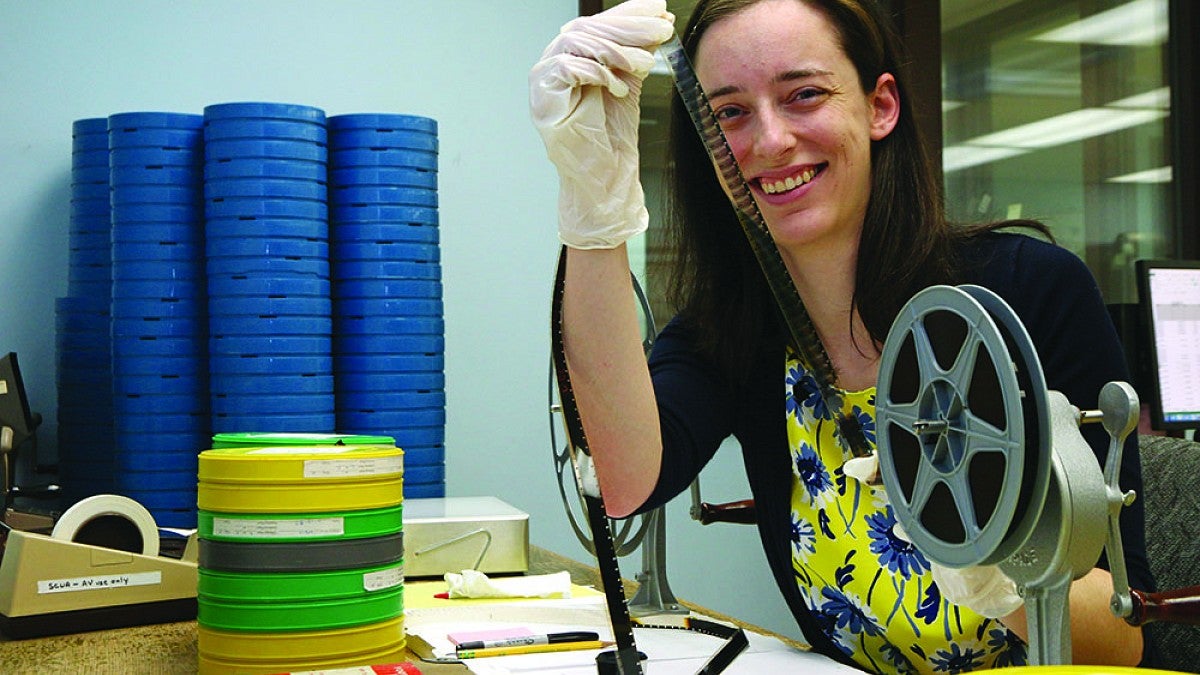It might be surprising to learn that the biggest academic employer on campus is the UO Libraries system. Even more surprising is the variety of work students do.
Yes, they reshelve books. But they also process the new ones and repair precious old ones. Student employees administer user experience surveys, help patrons navigate databases, and troubleshoot problems with the information technology infrastructure.
Tutors help hundreds of their fellow students with math homework and test preparation. At the Center for Media and Educational Technologies, student workers retrained the entire UO teaching faculty last year, bringing them up to speed on a new learning management platform. And a student archivist unearthed footage of the first sub-4-minute mile ever run on U.S. soil.
Lauren Goss, a master’s student in library and information science, uncovered that gem working as a Thomas Intern with the UO Libraries. One of her tasks is preserving and classifying the Athletics Film Collection, which includes almost 4,000 items spanning the 1930s to the 2000s.
Working to identify unmarked reels, Goss discovered long-lost footage of 1958 UO graduate Jim Bailey’s historic run at the Los Angeles Memorial Coliseum in 1956. The significance of the clip didn’t escape Goss, a third-generation Duck who earned her bachelor’s degree at the UO.
Among her latest discoveries is color footage of the 1939 victory parade and celebratory dance following the Tall Firs’ national championship in men’s basketball.
“Beyond just athletics,” she reflects, “this collection is a great record of life on campus for 80 years of students like myself and my parents and grandparents.”
For many students, a part-time job is not just about pocket money. It’s the only way they can pay the rent and buy food and books. However, the benefits of a good campus job are more than financial, said Patrick Moore, the library’s human resources manager.
“There are many advantages for a student who works on campus as opposed to taking a job at the grocery store, for example,” Moore said. “Our student workers often have the opportunity to do work and get training that relates more directly to their studies. In most cases, we can also offer them greater scheduling flexibility, helping them balance their schoolwork and job responsibilities. Finally, working on campus facilitates their making additional connections with faculty members, professional staff and fellow students outside their schools and majors.”
Tom Wolken, a 2016 graduate who worked in the science and math libraries, said he landed his library job thanks to a lucky email tip his first year on campus. A physics major from day one, he was thrilled to find a job opportunity that directly involved science and math.
Wolken was also intrigued to learn that one of the duties was tutoring. He knew that would be a challenging job — the UO Libraries likes to refer to these tutors as “mathletes.”
“It definitely sharpened my own math skills, being able to tutor at the Math Library,” he said. “In fact, I decided to double major in math after I started getting all this practice.”
This fall, Wolken will begin graduate studies in the medical physics program at Oregon Health and Science University. Looking back, how would he assess his time as a student employee with the UO Libraries?
“Amazing,” he said. “By far the best job I could have picked for my college career, because they work around your schedule, help you stay motivated and I got to help other students stay motivated.”
One thing that all these jobs have in common: The UO depends on the generosity of donors to keep offering so many of them.
Though a number of the library’s student workers have federal work-study support, many others do not. To offer the broadest opportunities, attract the best pool of applicants and provide work for the maximum number of students, the library must raise additional funds through donor gifts.
“We can’t thank our generous donors enough for their amazing support of student jobs at the UO Libraries,” said Adriene Lim, dean of libraries and Philip H. Knight Chair. “These donors understand that student employment is essential to our mission of service to the campus community. We provide students with learning opportunities to gain the types of skills and professional experiences that will appeal to future employers, while at the same time we make it possible for some students to earn the extra income that allows them to stay in school.”
It all adds up to a big win for everyone involved: the student employees and their families, the UO Libraries and the university community.
—By Jason Stone, UO Libraries


